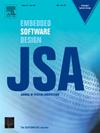IEEE 802.1时间敏感网络中基于机器学习的标记数据集生成入侵检测框架
IF 3.7
2区 计算机科学
Q1 COMPUTER SCIENCE, HARDWARE & ARCHITECTURE
引用次数: 0
摘要
IEEE 802.1时间敏感网络(TSN)技术已越来越多地应用于关键任务系统中,以建立具有有限延迟的确定性通信。由于安全保障在此类系统中至关重要,因此TSN协议的保护也被提升为最高优先事项之一。在这项工作中,我们提出了一个基于机器学习(ML)的入侵检测框架,用于针对基于tsn的平台上的低速率拒绝服务(LDoS)攻击。在ddos攻击中,受害者流的消息周期被巧妙地操纵,这使得检测更具挑战性。为了应对这一挑战,我们根据攻击检测性能和计算成本评估和比较了框架内的几种ML算法。我们还探讨了两种不同的缓解策略,以减轻数据不平衡的影响,这是由LDoS的性质所施加的。据我们所知,我们的工作是文献中第一个提出基于ml的入侵检测框架和TSN数据集的工作,该数据集包含针对基于TSN的车载网络的模拟ddos攻击。本文章由计算机程序翻译,如有差异,请以英文原文为准。
A Machine Learning-Based Intrusion Detection Framework with Labeled Dataset Generation for IEEE 802.1 Time-Sensitive Networking
IEEE 802.1 Time-Sensitive Networking (TSN) technology has been increasingly embraced in mission-critical systems to establish deterministic communication with bounded latency. Since safety and security are of prime importance in such systems, the protection of TSN protocols has also been elevated to one of the highest priorities. In this work, we present a machine learning (ML)-based intrusion detection framework against low-rate denial of service (LDoS) attacks on TSN-based platforms. In LDoS attacks, the message period of victim streams are subtly manipulated, that makes their detection more challenging. Addressing this challenge, we evaluate and compare several ML algorithms within our framework in terms of their attack detection performance and computational cost. We also explore two different mitigation strategies to alleviate the effects of data imbalance, which is imposed by the nature of LDoS. To the best of our knowledge, our work is the first in the literature by presenting an ML-based intrusion detection framework and a TSN dataset that contains simulated LDoS attacks targeting a TSN-based in-vehicle network.
求助全文
通过发布文献求助,成功后即可免费获取论文全文。
去求助
来源期刊

Journal of Systems Architecture
工程技术-计算机:硬件
CiteScore
8.70
自引率
15.60%
发文量
226
审稿时长
46 days
期刊介绍:
The Journal of Systems Architecture: Embedded Software Design (JSA) is a journal covering all design and architectural aspects related to embedded systems and software. It ranges from the microarchitecture level via the system software level up to the application-specific architecture level. Aspects such as real-time systems, operating systems, FPGA programming, programming languages, communications (limited to analysis and the software stack), mobile systems, parallel and distributed architectures as well as additional subjects in the computer and system architecture area will fall within the scope of this journal. Technology will not be a main focus, but its use and relevance to particular designs will be. Case studies are welcome but must contribute more than just a design for a particular piece of software.
Design automation of such systems including methodologies, techniques and tools for their design as well as novel designs of software components fall within the scope of this journal. Novel applications that use embedded systems are also central in this journal. While hardware is not a part of this journal hardware/software co-design methods that consider interplay between software and hardware components with and emphasis on software are also relevant here.
 求助内容:
求助内容: 应助结果提醒方式:
应助结果提醒方式:


